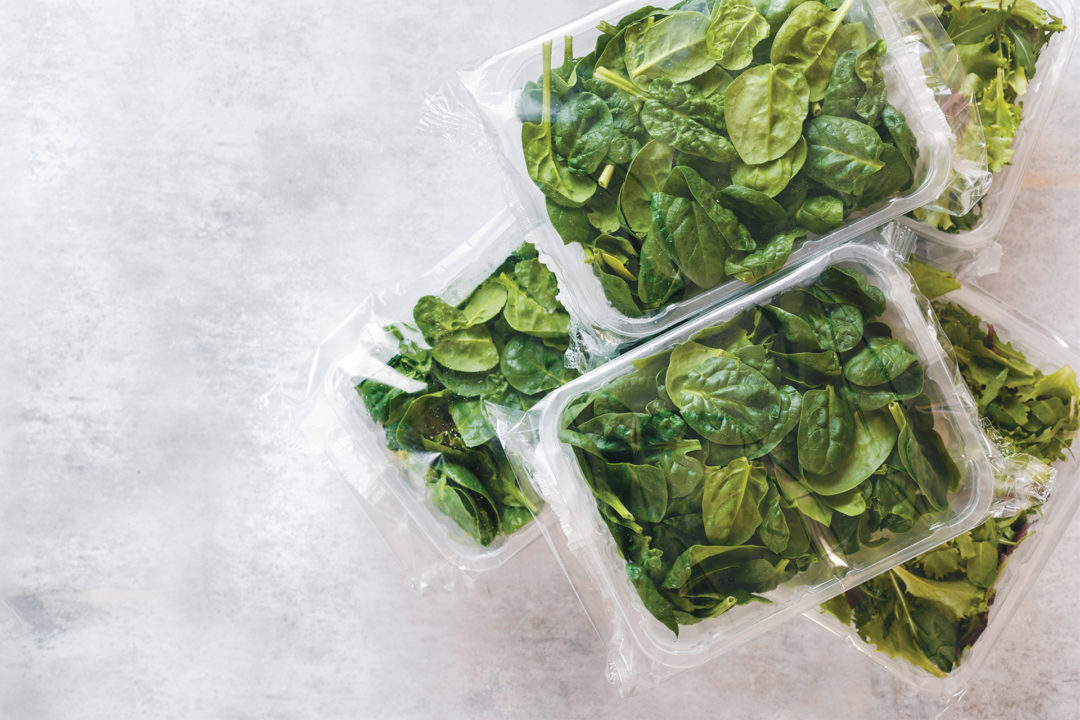Packaging is a problem. “The packaging we rely on in our daily lives is resource-intensive to produce and carries harmful environmental side effects,” according to One Step Closer (OSC), which launched the Packaging Collaborative in 2013 to address the issue. “Plastic packaging is extremely wasteful, and the current packaging systems have been optimized for pricing and efficiency without accounting for the environmental and public health impacts. Due to poor product design and lack of political infrastructure, the majority of plastic waste is sent to landfills or disposed of into the environment. We need a solution to this linear ‘take, make, waste’ mode. The circular economy has the capacity to turn trash into treasure–it is regenerative by design and aims to gradually decouple growth from the consumption of finite resources. By taking a systemic approach to economic development designed to benefit businesses, society, and the environment, a circular economy can be the solution to our packaging problem.”
While it can seem overwhelming, OSC stresses the power of action. “Sometimes, large changes come from small, incremental ones,” the organization explains. “That means that you can play an essential part in reducing packaging waste by committing to circularity. Take a big step for your packaging journey by committing to transitioning at least one material to a more sustainable option by the end of 2023.” Companies can do that by making a pledge to help reduce waste in their own way on the OSC site.
What is sustainable packaging?
Paul Harencak, VP, LPS Industries recently discussed the issue in the blog post Sustainability Packaging: How Committed is Your Brand? Harencak pointed to the definition from SustainablePackaging.org, which says sustainable packaging:
• Is beneficial, safe, and healthy for individuals and communities throughout its life cycle
• Meets market criteria for both performance and cost
• Is sourced, manufactured, transported, and recycled using renewable energy
• Optimizes the use of renewable or recycled source materials
• Is manufactured using clean production technologies and best practices
• Is made from materials that are healthy throughout the life cycle
• Is physically designed to optimize materials and energy
• Is effectively recovered and utilized in biological and/or industrial closed loop cycles.
Recent innovations in the packaging space
Flexible packaging
LPS introduced a multi-layer 100% recyclable film used to create flexible packaging solutions such as recyclable stand up pouches. “Survey after survey shows consumers prefer brands that use environmentally friendly packaging,” the brand notes, adding that this solution enables products to be packaged in 100% recyclable packaging that offers the protection and convenience consumers have come to expect with the eye-catching graphics that will help you stand out on the shelf.
PFAS-free
Mitsubishi Gas Chemical (MGC) offers a “future-proof” packaging solution in response to the growing legislation around per- and polyfluoroalkyl substances (PFAS), which are chemical additives that experts say can be harmful to human health and the environment. MGC’s AGELESS oxygen absorber technology replaces PFAS with a proprietary formula, where the oxygen absorbers are oil-resistant and can deoxidize the interior or sealed packaging to maintain flavor, color, fragrance, and nutrition of freshly prepared food. It is intended to protect and preserve snacks, baked goods, pet treats, nutraceuticals, and more.
Another offering: Great American Packaging (GAP) launched OneEarth Packaging solutions, focused on meeting consumer demands for a healthier, more sustainable future. It is made without PFAS, and comes in compostable and recyclable options to appeal to consumers who want cleaner and safer choices without sacrificing packaging performance and manufacturability.
Recycled paperboard
Graphic Packaging International (GPI) provides sustainable paper-based packaging solutions for a variety of products to food, beverage, and more. The company specializes in coated recycled paperboard, coated unbleached kraft paperboard and solid bleached sulphate paperboard.
Plant-based
Melodea offers MelOx NGen, a high-performance barrier product engineered to allow for the recyclability of plastic food packaging. It is a water-based, plant-sourced coating designed to line the inside surface of plastic food packaging such as films, pouches, bags, and blister packs The coating helps protect and extend shelf-life of foods such as snacks, confectionery, nutrition bars, meats, and dairy products as well as pharmaceuticals.
Attention Independent Retailers!
Liviri's new grant program will award resources to an independent grocer. The company, which offers the Liviri Sprint line of reusable totes that helps grocers with staging and delivery while helping to eliminate single-use packaging, says it is committed to supporting grocers in optimizing supply chain management for the eGrocery sector. “Liviri’s primary focus is to innovate solutions for grocery delivery and pick-up processes that are efficient, cost-effective and advance the evolution of the industry,” said General Manager Ken Longval. “We understand that implementing and optimizing these programs can be a challenge for independent grocers and we are launching this program to provide support in taking their efforts to the next level.”
Grocers can enter at https://cloud.email.liviri.com/egrocer-grant by September 29, 2023. Entrants must be independent grocers with three or fewer locations, must demonstrate an e-grocery delivery process that is already in place/in progress, and must show a strong need to increase operational efficiency in the current process.
The total prize value of more than $7,000 includes: $5,000 cash prize (intended to help cover costs to build up tech platforms, freezers, fridges, and training), 12 Liviri Sprint50 Insulated Totes, Sprint50 Ice Packs and Dividers, and two Picking Carts. WF










